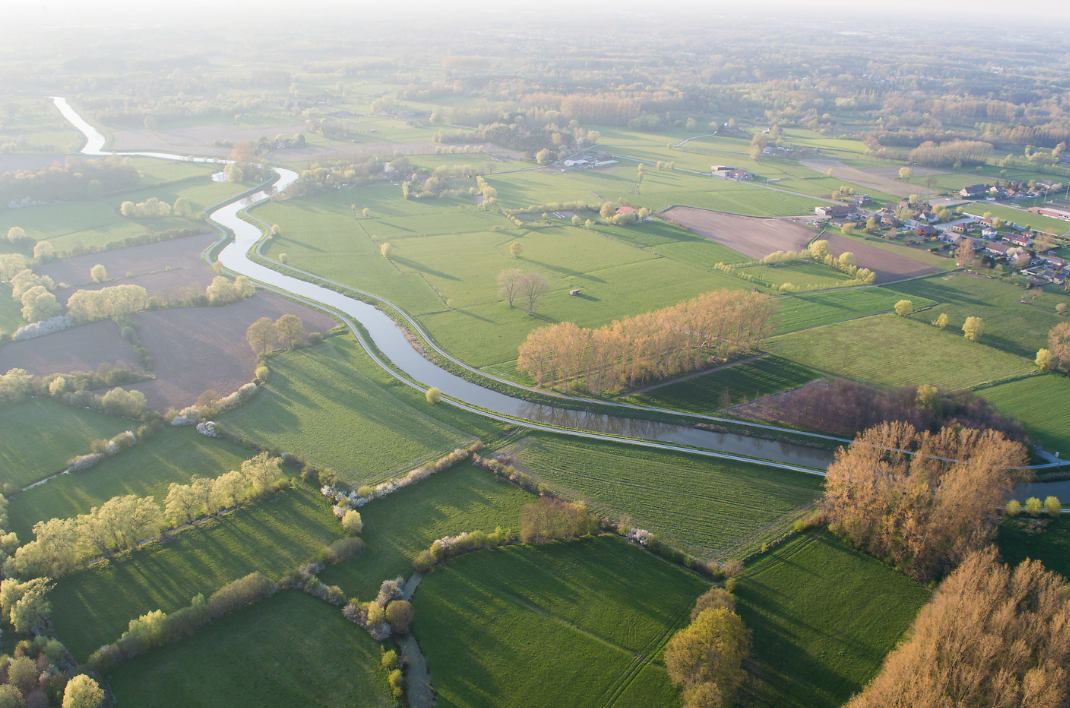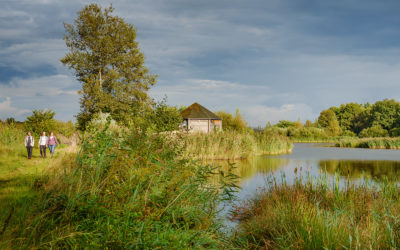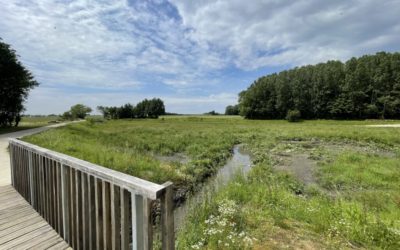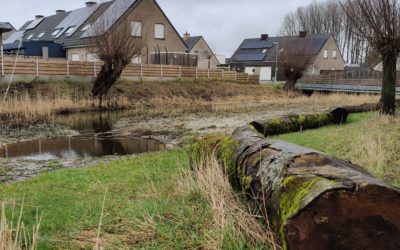The first and only Unesco Man & Biosphere area in Belgium
Wetlands4Cities
Het project
Wetlands4Cities is een project van Natuurpunt in samenwerking met Ecover, fabrikant van een gamma milieuvriendelijke schoonmaak- en andere producten. Het project wil vijf stedelijke wetlands in Vlaanderen aanleggen en ze omvormen tot hotspots van biodiversiteit, die fungeren als natuurlijke klimaatbuffers.
Wetlands zijn hotspots van biodiversiteit waar duizenden planten- en diersoorten gedijen. Het zijn natuurlijke sponzen die tal van mogelijkheden bieden om klimaatverandering tegen te gaan. Deze robuuste en natuurlijke klimaatbuffers spelen een cruciale rol in het vasthouden en vastleggen van water, het voorkomen van watertekorten, het temperen van hitte en het reduceren van koolstof in de atmosfeer. Op die manier verbeteren we ook de levenskwaliteit in Vlaanderen, vooral in de steden.
De natuurlijke klimaatbuffers maken deel uit van het Europese Natura 2000-netwerk, het Vlaams Ecologisch Netwerk (VEN, dat grote natuurlijke eenheden omvat) en/of liggen in beekdalen. De geplande ontwikkelings- en herstelactiviteiten dragen dan ook aanzienlijk bij tot het versterken en verbeteren van de connectiviteit en de integriteit van het ecologische netwerk in Vlaanderen.

Locatie project
Bijdrage(s)
Projectkosten
Deelnemer(s)

- Vlaamse Milieumaatschappij (VMM)
- Natuurpunt
- Pidpa: regenwater afkoppelen om gescheiden riolering te maximaliseren
- Stad Mechelen: depavement in de stad
- Inwoners van Mechelen (tuintesters/meetzwam)
Hoe wordt aan de criteria van de doelstelling voldaan?
Nature-based solutions
In alle Wetlands4Cities gebieden streven we ernaar de bestaande kwetsbare natuur te versterken, te behouden en te herstellen door herbevloeiing. Stedelijke wetlands moeten meer zijn dan een moeras, een plas water of een waterbuffer. Het zijn hotspots van biodiversiteit waar duizenden planten- en diersoorten gedijen. Wetlands zijn belangrijke stopplaatsen voor trekvogels en broed- en overwinteringshabitats voor vogels. Op deze manier dragen we bij aan het herstel en behoud van biodiversiteit, met name in stedelijke gebieden.
De natuurlijke klimaatbuffers maken deel uit van het Europese Natura 2000-netwerk, het Vlaams Ecologisch Netwerk (VEN, dat grote natuurlijke eenheden omvat) en/of liggen in beekdalen. De geplande ontwikkelings- en herstelactiviteiten dragen dan ook aanzienlijk bij tot het versterken en verbeteren van de connectiviteit en de integriteit van het ecologische netwerk in Vlaanderen.
In de projectgebieden (Uitkerkse Polder, Meirdam, Houzekouter, Hobokense Polder, Mechels Broek, Pinsbeemden, ...) die in totaal meer dan 200 hectare beslaan, worden bestaande wetlands uitgebreid en hersteld. In Hobokense Polder gaan we bijvoorbeeld 3 hectare nieuw wetland ontwikkelen en in Meirdam gaan we meer dan 20 hectare opnieuw bevochtigen. In Mechels Broek, dat meer dan 100 hectare groot is, willen we de droogtebestendigheid versterken door het gebied weer te verbinden met de omliggende waterlopen (Vrouwvliet en Dijle) en het landschap te vernatuurlijken. De aanleg van nieuwe groene en blauwe ruimten met grote biodiversiteit bevordert de biodiversiteit en maakt het herstel van verschillende vegetatie- en diersoorten mogelijk.
Alle Wetlands4cities-gebieden liggen op maximaal 5 tot 10 kilometer afstand van een middelgrote stad (+/- 50.000 inwoners). We zorgen ervoor dat de peri-urbane natuur van de geselecteerde steden (Antwerpen, Mechelen, Brugge, Dendermonde, Hasselt, Aalst) wordt versterkt en waar mogelijk hersteld. Door de ontwikkeling van deze natuurlijke klimaatbuffers dragen we dus bij tot de (her)naturalisatie van stedelijke en randstedelijke gebieden.
Mogelijke initiatieven waarbij het project betrokken is :

Onderhoud op lange termijn
De beheerspraktijken worden altijd aangepast aan het gebied. Maaien is bijvoorbeeld beperkt (alleen wanneer nodig) en overtollig gras wordt afgevoerd. Er worden geen chemicaliën of biociden gebruikt en waar mogelijk worden elektrische machines gebruikt (om de uitstoot van CO2 en fijnstof (PM) te verminderen). In Mechels Broek wordt Galloway vee gebruikt voor het beheer van het gebied.
Bij het beheren en ontwikkelen van infrastructuur gebruiken we waar mogelijk natuurlijke materialen (hout, takken, ...) om wandelpaden, informatiepanelen en/of hekken te maken.
Beheerpraktijken en landschapsontwerp zijn altijd aangepast aan het gebied. We proberen niet alleen de ecologische kenmerken te respecteren, we proberen ze ook te versterken om de bestaande wetlands te verbeteren. Dit doen we door extra water te bufferen via aangepast polderbeheer, het plaatsen van stuwen of het afgraven van historisch opgehoogd land. Grote werken vinden altijd plaats buiten het broedseizoen in het voorjaar om verstoring tot een minimum te beperken. Waar mogelijk worden vlonderpaden aangelegd om de kwetsbare bodem niet te verstoren en delen worden afgesloten voor publiek om schade en verstoring te voorkomen. We werken zoveel mogelijk met gelabelde producten en materialen (bijv. FSC gelabeld hout, biologische oliën) en nemen dit als voorwaarde op in onze aanbestedingen (groene inkoop).
Onze beheermaatregelen zijn optimaal aangepast aan de omgeving, om de landschappelijke waarden te respecteren en deze wetlands in het landschap te integreren. Hiervoor maken we gebruik van historische kaarten (Ferraris, Vander Maelen) om de geschiedenis van het gebied te bestuderen en waar mogelijk te herstellen. Bijvoorbeeld grachten en singels in Meirdam of het herstel van het oorspronkelijke waterpeil in de Uitkerkse Polder (Brugge). Voor dit project hebben we drie soorten stedelijke wetlands gedefinieerd: wetlands gelegen/beïnvloed door de zee, antropogene wetlands (ontwikkeld door de mens) en natuurlijke wetlands waar we een bestaand of historisch wetland herstellen.
Alle planten die we (her)introduceren in de gebieden zijn inheemse planten (indien beschikbaar). Ook invasieve uitheemse soorten (reuzenberenklauw, Japanse duizendknoop, ...) worden waar mogelijk uit de gebieden verwijderd.
Voordelen
Wetlands behoren tot de waardevolste ecosystemen in Europa en worden gekenmerkt door unieke, sterk bedreigde habitats. Het zijn hotspots van biodiversiteit waar duizenden planten- en diersoorten gedijen. Wetlands zijn belangrijke stopplaatsen voor trekvogels en broed- en overwinteringshabitats voor vogels. Door deze stedelijke wetlands te herstellen, versterken we de biodiversiteit in stedelijke gebieden en behouden we zeldzame habitats en soorten in Vlaanderen.
Daarnaast hebben stedelijke wetlands op verschillende manieren een positief effect op de leefomgeving van de lokale bewoners en voor de bevolking. Stedelijke en randstedelijke gebieden hebben meer te lijden van de opwarming van de aarde. Metingen laten een groot verschil zien tussen de temperatuur in steden en op het platteland. Dit verschil kan soms oplopen tot 6-10 °C op een warme zomeravond. Het is bewezen dat natte natuur en groen een verkoelend effect hebben. Wetlands kunnen een vitaal onderdeel vormen van het blauwgroene netwerk van een stad en een welkom verkoelend effect hebben tijdens hittegolven. Hittegolven komen steeds vaker voor in Vlaanderen en leiden gedurende bepaalde periodes tot een verhoogde mortaliteit.
Steeds meer wetenschappelijk onderzoek wijst op het belang van groen en open ruimten voor het mentale en fysieke welzijn van mensen. De aanleg en ontwikkeling van stedelijke wetlands kan bijdragen aan een betere gezondheid en welzijn van de plaatselijke bewoners. Naast het bieden van een koele plek om te schuilen op een warme zomerdag, kunnen stedelijke wetlands ook dienen als een mentaal toevluchtsoord voor de plaatselijke bewoners waar ze tot rust kunnen komen en zich vredig kunnen voelen. Wetlands kunnen ook helpen bij het verbeteren van de luchtkwaliteit in stedelijke gebieden, die in veel (grote) steden onvoldoende is.
Andere projecten in verband met de doelstelling: "Nature-based solutions"
Bufferbeken Nossegem
Aanpassingen zorgen voor betere werking bufferbekken langs Kleine Beek in Nossegem.
Reynaertwijk
Een klimaat robuust ontwerp die toekomstgericht waardevol is voor mens en dier.


